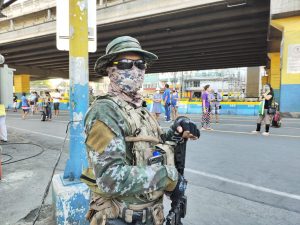The Philippines has recently been battered by COVID-19, reporting more confirmed cases and deaths than any other country in Southeast Asia. Researchers and the country’s health minister, however, have expressed optimism that new infections are on the downswing.
The independent Octa Research Group noted a “decelerating trend” of new coronavirus cases in a September 26 report but warned against prematurely easing community quarantine restrictions, especially in Metro Manila, the capital’s sprawling metropolitan area.
According to the report, the Philippines’ reproduction number, or R number, fell to 0.82 between September 16 and 23. A R rate of below 1 is considered a sign that the disease is being contained.
The research group recommended that Metro Manila remain under general community quarantine (GCQ) rather than downgrading the area to a more relaxed quarantine, saying such a move “may lead to exponential growth in the number of cases and deaths apart from overwhelming our health care system.”
Health secretary Francisco Duque III warned this week that the country’s current trajectory has not yet reached a “significant level,” telling CNN Philippines “the goal is to have a downward trajectory.”
The Philippines has struggled with surges of new COVID-19 infections despite implementing some of the world’s strictest lockdowns. The first, announced in March, drew criticism for an enforcement-heavy approach that saw thousands of quarantine violators arrested.
Metro Manila went back into a strict lockdown in August after an easing of restrictions was followed by a spike in cases, leading health workers to plead with President Rodrigo Duterte to re-institute mandatory quarantines to ease the burden on the area’s hospitals.
The lockdown worked, as cases began to level off in August before trending downward slightly in September, but the report’s warning against lifting current restrictions has clearly been influenced by the earlier decision to lift quarantine measures in an attempt to jump start the economy.
The Philippines also reopened schools this week, drawing criticism from some teachers and government officials.
The Octa report stated that while cases in Metro Manila have decreased, the country still has several high-risk areas, or places which report over 100 daily cases, and emerging hotspots, or areas that have reported increases in new cases over a two-week period numbering at least 10 cases per million people.
The city of Marawi and Lanao del Sur province in Mindanao were placed in lockdown starting October 1 due to a spike in cases in the area. The war-torn city was put under siege in 2017 by Islamic State-affiliated militants; many of its residents remain displaced while much of the city itself remains in ruin.
Despite the public health and economic impacts of the coronavirus in the Philippines, Duterte remains widely popular as he nears the end of his single six-year term in May 2022.
An opinion poll conducted by Pulse Asia and released Monday showed that 91 percent of respondents approve of the president’s performance and his personality. A December survey showed 87 percent approval of his performance.
Duterte has retained broad public support since becoming president in 2016, despite receiving intense criticism from domestic groups along with international organizations and watchdogs, especially for his brutal war on drugs.
He is barred from running for a second term in 2022, but strong approval ratings heighten the chance that the government will remain in the control of his allies once he leaves the presidency.
It’s been heavily speculated that Sara Duterte-Carpio, the president’s daughter and current mayor of Davao City, or Christopher “Bong” Go, a senator and Duterte’s longtime right-hand man, could be plotting presidential runs in 2022 – and whoever receives the support of the incumbent will be granted a major advantage.
Duterte’s approval ratings show that Filipinos are blaming the country’s economic decline on COVID-19 rather than the government’s handling of the crisis, Pulse Asia president Ronnie Holmes said in a television interview.
The Pulse Asia survey was conducted in and around Metro Manila. Duterte’s traditional base of support remains in the country’s south, especially Mindanao, where he served as mayor of Davao City for over 20 years.

































